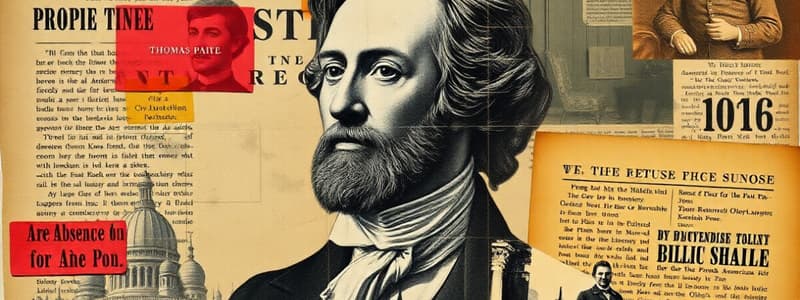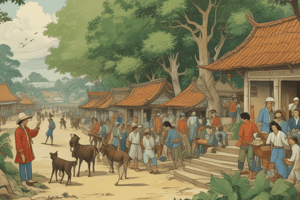Podcast
Questions and Answers
What was the significance of Thomas Paine's pamphlet 'Common Sense'?
What was the significance of Thomas Paine's pamphlet 'Common Sense'?
- It provided complex ideas in inaccessible language.
- It was primarily a collection of poems.
- It argued against American independence.
- It motivated everyday people to seek freedom from British rule. (correct)
How did poets like Phillis Wheatley contribute to the revolutionary movement?
How did poets like Phillis Wheatley contribute to the revolutionary movement?
- They highlighted the struggles for freedom and challenged the status quo. (correct)
- They discouraged people from participating in the movement.
- They focused exclusively on British literature.
- They wrote primarily about nature and beauty.
What role did colonial newspapers play in the revolutionary movement?
What role did colonial newspapers play in the revolutionary movement?
- They served as a platform for poetry contests.
- They were mainly used to promote British interests.
- They reported on events and fostered a sense of unity among colonists. (correct)
- They only published advertisements and entertainment.
What famous phrase is attributed to Patrick Henry that encapsulated the desire for freedom?
What famous phrase is attributed to Patrick Henry that encapsulated the desire for freedom?
What is the primary purpose of the Declaration of Independence?
What is the primary purpose of the Declaration of Independence?
Flashcards
Pamphlet's role during the revolution
Pamphlet's role during the revolution
Pamphlets were the social media of the 18th century, allowing writers to rapidly spread revolutionary ideas, such as Thomas Paine's "Common Sense" which advocated for American independence and inspired colonists to seek freedom from British rule.
Thomas Paine's "Common Sense"
Thomas Paine's "Common Sense"
"Common Sense", written by Thomas Paine in 1776, argued for American independence using clear and accessible language, making complex ideas understandable for everyday people and turning doubt into resolve among the colonists.
Poetry's role in the revolution
Poetry's role in the revolution
Poetry, especially by poets like Phillis Wheatley, served as a vital tool for challenging the status quo and advocating for freedom during the revolution. Wheatley's work addressed the struggles of enslaved individuals and stressed the importance of liberty for all.
Letters from the frontlines
Letters from the frontlines
Signup and view all the flashcards
Newspapers' role in the revolution
Newspapers' role in the revolution
Signup and view all the flashcards
Study Notes
Revolutionary Literature in America
- American literature played a vital role in the fight for freedom.
- Pamphlets, like Thomas Paine's Common Sense, were influential.
- Pamphlets quickly spread revolutionary ideas in the 18th century.
- Common Sense, published in 1776, advocated for American independence.
- Paine's writing used clear language, making complex ideas accessible.
- His words transformed doubt into resolve among colonists.
- Poetry played a crucial role.
- Poets like Phillis Wheatley used verses to challenge the status quo.
- Wheatley's work highlighted the struggles of enslaved individuals and emphasized liberty for all.
- Letters exchanged between soldiers and families revealed the human side of the revolution.
- These personal accounts showed emotions, fears, and the hopes of those fighting for freedom.
- Colonial newspapers disseminated revolutionary ideas, reported events, published editorials, and offered public forums for debate.
- The free press united the colonies and fostered a sense of shared purpose.
- Powerful speeches, such as Patrick Henry's, stirred emotions and rallied support for freedom.
- Henry's "Give me liberty, or give me death!" became a rallying cry.
- The Declaration of Independence, written by Thomas Jefferson, is a cornerstone of American literature.
- It's an eloquent expression of inalienable rights and the pursuit of happiness.
- It united the colonies and defined the American identity.
- Fictional works, like those by Charles Brockden Brown, explored freedom, identity, and societal struggles.
- These narratives gave readers lenses to understand the revolution's influence.
- Women like Abigail Adams and Mercy Otis Warren contributed to literature, advocating for women's rights and equality.
- Their voices shaped discourse about freedom and justice.
- Revolutionary literature laid the groundwork for future movements.
- It reminded generations of the power of words to ignite change.
- The legacy of these writers continues to resonate today in discussions about freedom.
Studying That Suits You
Use AI to generate personalized quizzes and flashcards to suit your learning preferences.




